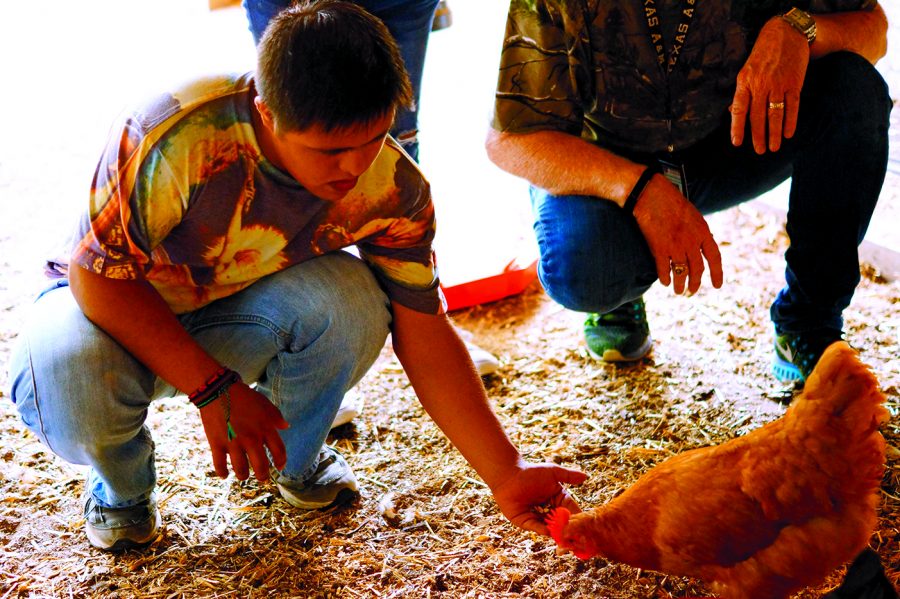Life skills raises chickens
October 10, 2017
Life skills teacher Wayne Johnson always has his eyes peeled for new avenues for vocational growth.
Last year, when he had the idea of starting a barnyard egg-selling business for his students, he talked with Tiffany Black, one of the Future Farmers of America (FFA) teachers at the time, about starting the business for this current year.
Sophomore Brandon Benavides is one of the students contributing to the business.
“[Raising the chicks] is going good,” Benavides said.
Twelve laying hens were donated by a graduating senior to the FFA teacher, who unexpectedly got a job in Wimberley leaving the hens without a caretaker.
“I never met him,” Johnson said. “The previous [agriculture] teacher told him that we were going to start a barnyard egg business in the fall. He was going to sell his hens on eBay, but decided to just give them to our life skills class instead.”
Johnson jumped in, taking charge of the hens during the summer break, spending time fixing up the coops on the Bowie FFA farm site, and sharing eggs with office staff during the summer months.
“Mr. Johnson made the coop,” Benavides said. “It’s really cool.”
When school time rolled around, Johnson knew he had the perfect opportunity to start a fun, hands-on business for his students to learn new skills. He named the mini barnyard egg-selling business, “The SPED Egg Plant”.
“The EggPlant provides our life skills students with numerous job task opportunities, instills good work ethic, and builds character and social skills,” Johnson said. “Students help take care of the chickens, label egg cartons, collect, clean, and box eggs, and then sell and deliver the eggs to teachers and staff.”
The life skill students enjoy interacting with the chickens by: opening the pens, feeding the fowl, and getting them back into the pens.
According to junior Angelica Gregorio, they typically feed the chickens “meal-worms” and occasionally give them “cherries” and other table scraps.
Currently there are three different coops, with one for the 12 adults that are capable of laying eggs, one for the eight younger ones who can’t yet, and then one for the 14 baby chicks.
“If you mixed them all together, they don’t always like each other,” Johnson said. “When you hear that term ‘pecking order’, that really is true. There’s always a chicken that runs the whole thing.”
The chickens are never mean or violent to the students or Johnson, but they are not afraid to enforce the pecking order with each other.
“If they don’t do what [the dominant chicken] is saying, they’ll hurt each other,” Johnson said. “One of them just got their feathers plucked out of it. I can always tell which ones are the aggressive ones.”
Johnson’s students charge $4 for each dozen eggs and $2 for a half-dozen. He’s found a resourceful and simple way for people to order eggs, and currently has around 40 teachers looking to purchase eggs from them.
“I created a Google doc so that teachers and staff could sign up on the ‘Pecking Order’ to place their order,” Johnson said. “When their name comes to the top of the ‘Pecking Order’ list, we deliver their eggs. Any money we make goes into feeding the chickens, buying equipment, or even buying new chickens.”
Since so many people are wanting to buy barnyard eggs, Johnson went to Callahan’s General Store to look into getting a few more chicks. When he explained what the class was doing and how they were starting the business, the store graciously donated fourteen chickens to the cause.
“The new chicks are about six weeks old and will start laying eggs at about six months old,” Johnson said. “I also bought eight other hens from a farm near Lake Travis. Those hens range from three to five months old and will hopefully begin laying eggs soon.”
The number of eggs that a chicken lays depends on age, weather conditions, and if the chickens are happy, but each hen generally lays an egg a day. The class does their best to keep the chickens safe and even work to make the chickens happy by giving them treats; dried mealybugs.
“We have a wide range of varieties of hens [and] some of them will even be laying blue eggs,” Johnson said. “As a general rule, hens are at their peak egg laying between six and eighteen months, however, they can lay eggs for up to three years.”
While some of the life skill students absolutely love the chickens and will do anything to help out with the project, others are fearful of the birds and don’t want anything to do with them. Johnson does all he can to make sure the students are comfortable with working with the fowl, and those who aren’t are given other responsibilities.
“All I do is get the eggs. I like it, after I bring the eggs back to my class,” Benavides said.
The egg selling business started on a small scale, but should be financially self-sufficient soon. It has proven to provide a great working environment and training ground for the students.
“In addition to the students’ hard work, we are very fortunate that our principal, Mr. Robinson, has been very supportive of all our efforts, and the feedback from teachers and staff as well as parents has been overwhelmingly positive and supportive,” Johnson said.










